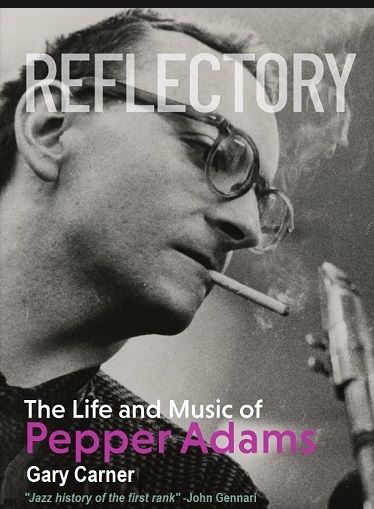Reflectory has been available for a month at this site:
https://www.pepperadams.com/Reflectory/index.html.
I want to thank those of you who were the first to
purchase my 37-year labor of love. I certainly hope
you’re enjoying it: the text, the photographs, and the
incredible music links. Please let me know what you
think of it. Laurent Briffaux in France did (see below),
and Glenn Wilson emailed me to say that he’s digging
the info about Detroit. There’s a lot of it!
I’m just about done correcting those pesky typos that
surfaced in the First Edition. The Revised Version will
soon replace the First Edition, and I’ll be using it for
future sales and reviews, and for what I’ll be reading on
the audiobook version that I expect to tackle this Spring.
I recently hired a PR firm to promote Reflectory. Word of mouth, and Facebook and Twitter posts only go
so far. As a result, I’m expecting a flurry of reviews in the
next few months, which I’ll share with you as they get
published.
I did an hour-long interview with Andrew Hadro at
jazzbarisax.com that should be posted soon. Also, I’ve
organized a panel discussion about Adams with fourteen
musicians from the U.S., Canada, and England that will
take place on Sunday, December 12. You can watch it live
at 2pm Eastern Time and send chat questions, or wait for
it to be posted on YouTube. I’ll post information about it in
early December.
Here’s Briffaux’s lovely review, one of my first buyers:
Le titre lui-même par sa mise en abime est l'essence du
livre. L'auteur, ami du saxophoniste Pepper Adams à la
fin de sa vie, lui avait promis de compléter et de publier
son histoire. Carner a fait bien mieux: pièce par pièce,
morceaux par morceaux, il lui construit un monument.
Livre-monde, on retrouve au fil des pages les stars et les
passants, les anecdotes et les aventures de toute une
scène. Impossible de ne pas y voir des personnages déjà
rencontrés, et de pas entendre l'écho de mélodies familières.
Chaotique et brillante, c'est la vie de celui qui cherche,
doute et parfois éclaire un instant votre propre vérité
intérieure. Reflectory pose un nouveau standard pour les
livres qui voudront traiter d'un musicien.
The title says it all, and works as an infinite mirroring device.
The author, a friend of saxophonist Pepper Adams in the last
years of his life, had promised to complete his story and publish
it. Carner did much better: piece by piece, track by track, he
built him a monument. In this meta-book, we meet throughout
the pages the stars and the passers-by, the anecdotes and the
adventures of a whole scene. It is impossible not to connect with
characters already seen, and not to hear the echo of familiar
melodies. Chaotic and brilliant, this is the life of one who seeks,
doubts and illuminates for a moment your own inner self.
Reflectory sets a new standard for books on a musician's life.
Moreover, it tells the urgency, the beauty and the luxuriance of life.



